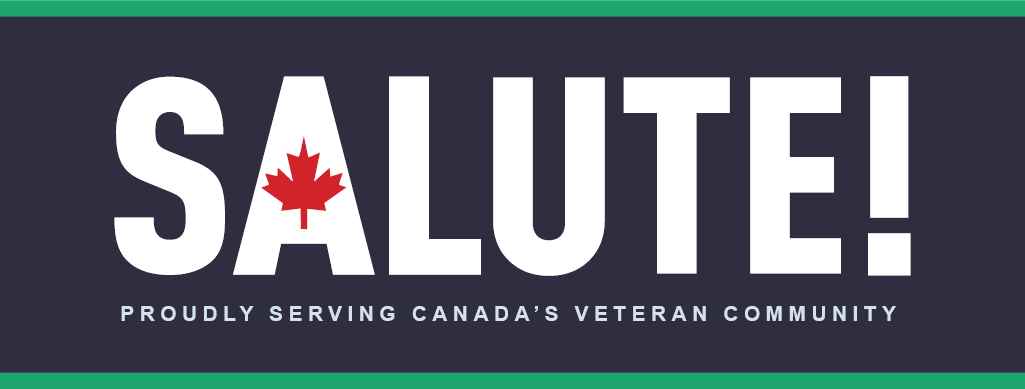In this edition:
- News
- From past to present: remembering D-Day 80 years later
- Programs and services
- Have your say on Veteran well-being
- Peer support: A powerful tool for Veteran well-being
- Spotlight on women Veterans
- Purge survivor and inclusivity advocate Martine Roy
- National Indigenous History Month
- New cenotaph, cemetery and healing garden fulfills long-time dream of Abegweit First Nation
- Veterans' stories
- At almost 100, Roly Armitage’s Second World War memories remained vivid
- Lynette Peters: Shaping the future
- Commemoration
- Learn more about the unknown Newfoundland First World War soldier arriving home
- Young Newfoundland and Labradorian Reservist feels kinship with unknown soldier
- Major-General ends military career by honouring an unknown Newfoundland soldier
- Canada’s military athletes: champions of resilience
- Commemoration calendar
- Engagement
- Learn to meditate as part of a new study for Canadian Veterans with PTSD
- Can Praxis and the healing power of equine therapy for Veterans and their families
- Call for applications: Veteran and Family Well-being Fund
- Apply for Community Engagement funding today
News
From past to present: remembering D-Day 80 years later
In honour of the 80th anniversary of D-Day and the Battle of Normandy, a Government of Canada delegation travelled to the beaches of Normandy earlier this month. For the 13 Second World War Veterans in the delegation, ranging in age from 98 to 104, this was likely one of their last visits.
Some refer to these Veterans as the “greatest generation.” They faced hardships that many of us can’t even begin to understand.
They are the living memory of the events that took place 80 years ago, but that living memory will soon pass.
We have a duty to honour those who have served, recognize the cost of war, remember their sacrifices, and keep their stories alive.
The delegation attended several events, large and small, in France. They observed moments of silence during visits to the Bény-sur-Mer and Bretteville-sur-Laize Canadian War cemeteries, to honour those who lost their lives.
On June 6, the Government of Canada held a moving ceremony at Juno Beach—the beach tasked to the First Canadian Army on D-Day. Following the ceremony attended by over 5,000 people, the Second World War Veterans and a few dignitaries took a moment to visit the very beach some of them stormed 80 years ago.
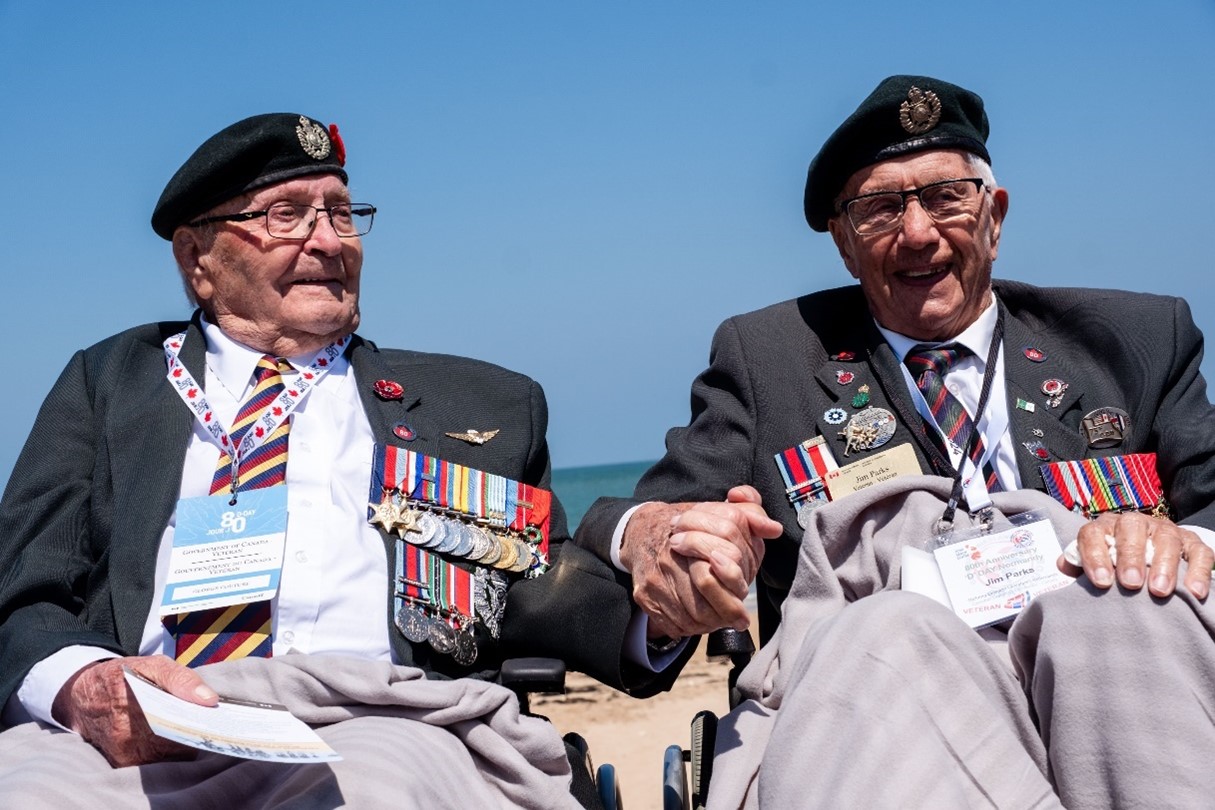
Canadian Veterans George Couture (left) and Jim Parks (right) share a tender moment on Juno Beach. Courseulles-sur-Mer, France, 6 June 2024.
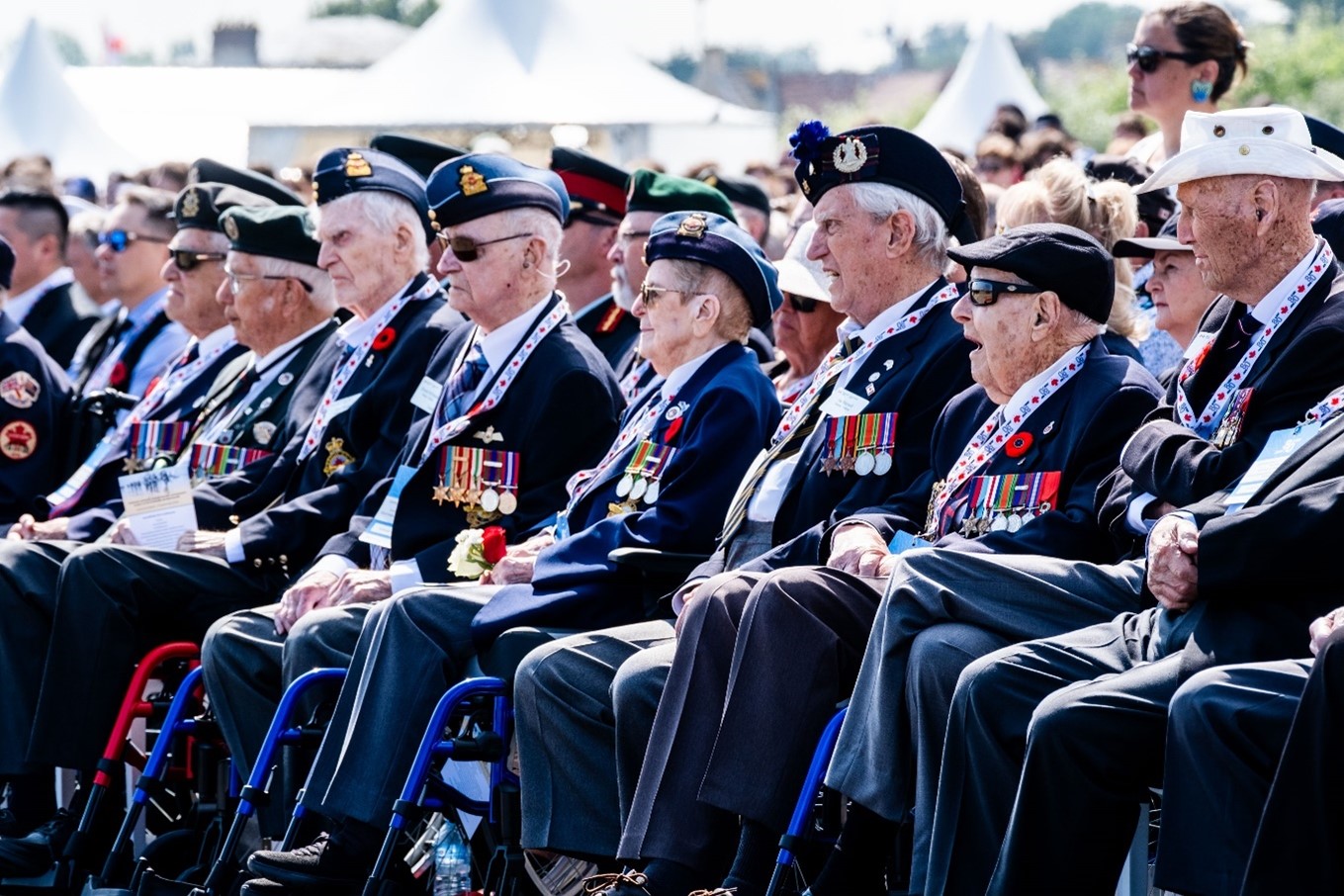
Canadian D-Day Veterans and guests attend the moving 80th anniversary of D-Day and the Battle of Normandy ceremony, Courseulles-sur-Mer, France, 6 June 2024.
The Government of Canada also organized commemorative events across the country to commemorate the participation of Canadians in D-Day and the Battle of Normandy, and to honour and recognize their bravery and sacrifices. These included commemorative activities in the Greater Moncton area in New Brunswick, which were attended by several Second World War Veterans.
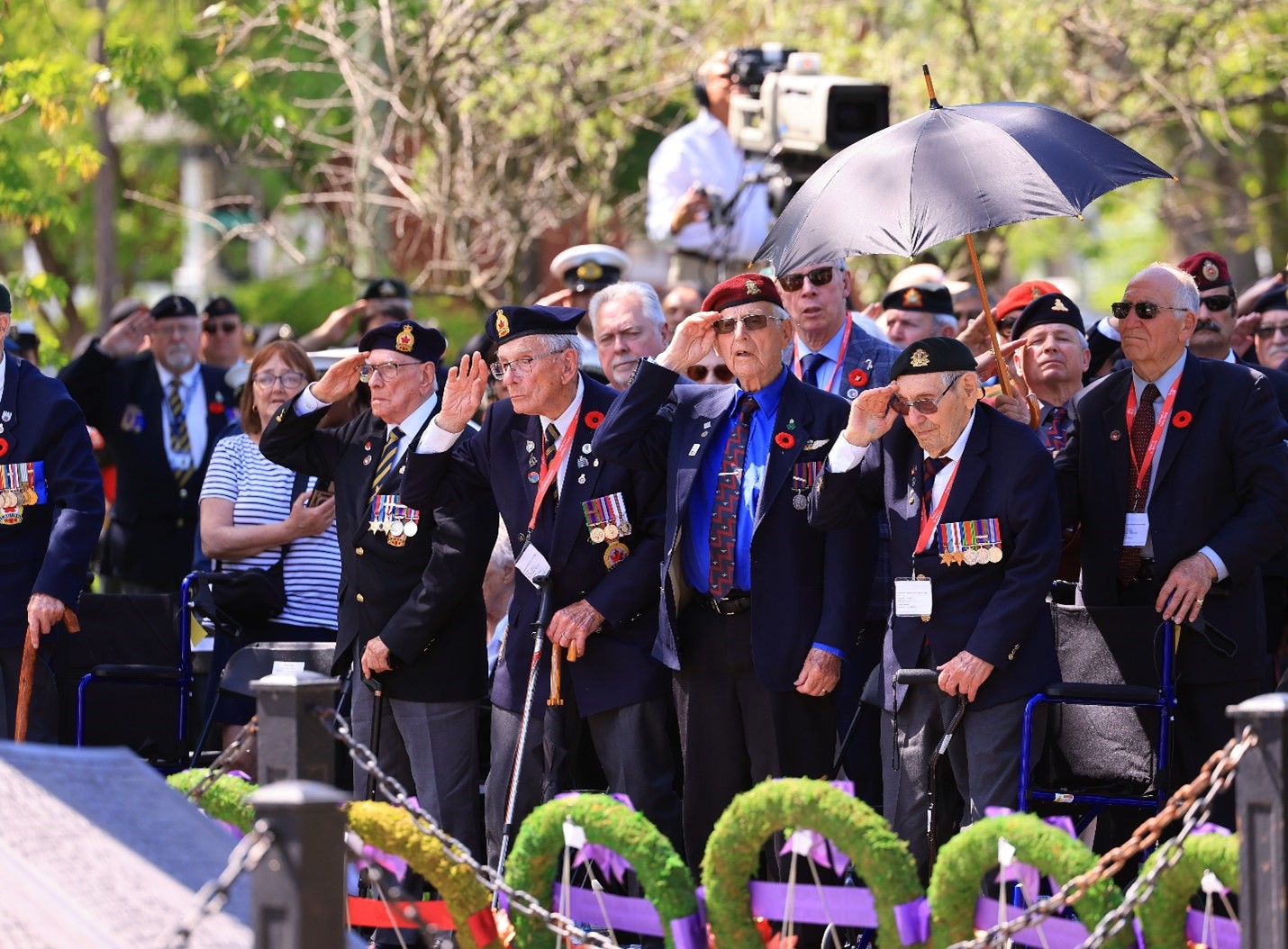
Veterans Horace Byford, Lloyd Coady, George Cooper and George Ferguson stand and salute during the Signature Ceremony for the 80th anniversary of D-Day and the Battle of Normandy held in Moncton, New Brunswick on 6 June 2024. Later that day, Mr. Byford and Mr. Ferguson received the French Légion d’honneur for their service during the Second World War.
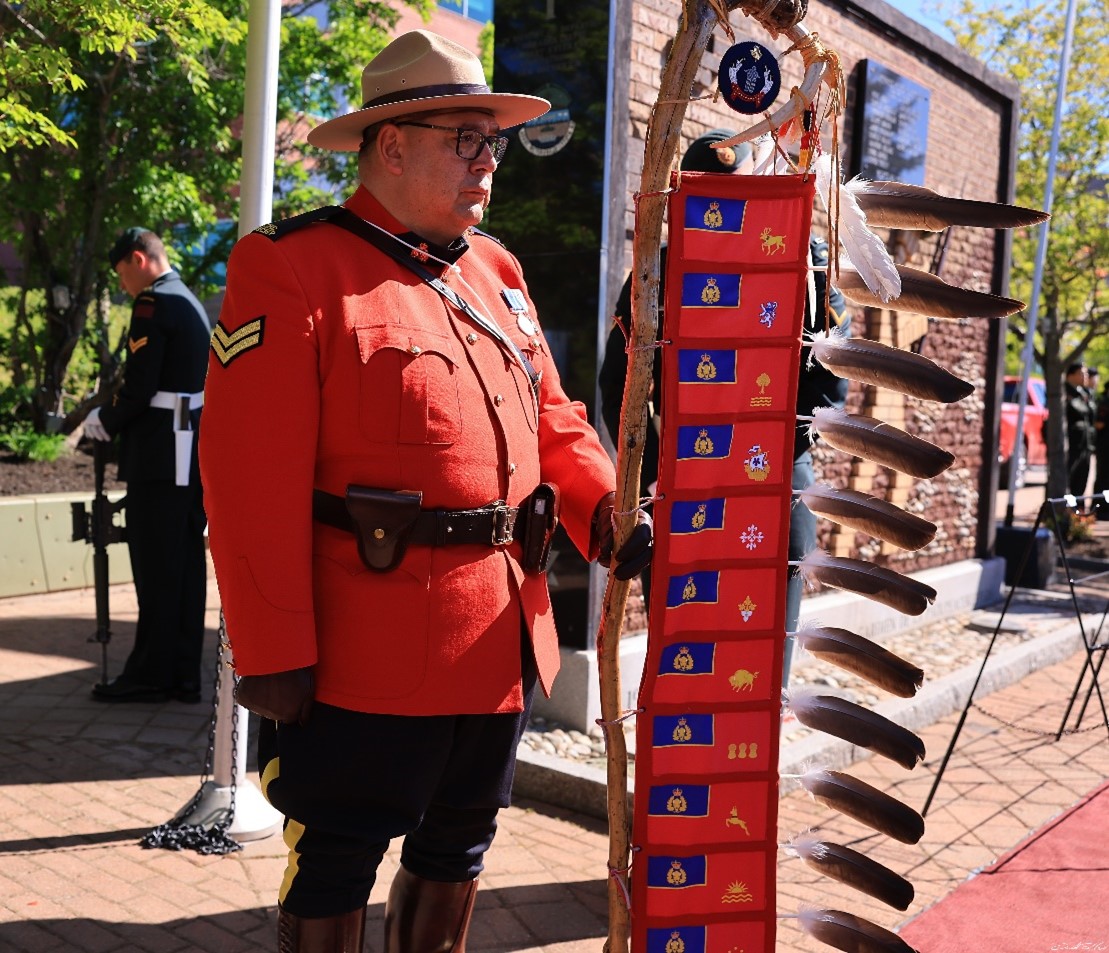
Corporal Larry McDonald, RCMP Eagle Staff Carrier, holds the Indigenous Eagle Staff beside a cenotaph in Dieppe, New Brunswick on 5 June 2024.
We were lucky to have a number of Veterans present for the anniversary. They sacrificed greatly for our country, and the onus is on us to share their stories and carry on their legacy.
Lest we forget.
Programs and services
Have your say on Veteran well-being

As a Veteran of the Canadian Armed Forces, your voice matters. Please complete the online survey to help shed light on Veterans’ health and well-being priorities. It’s part of our Veteran community health and well-being assessment.
How to take part in the survey
You can go directly to our online survey during June and July. It will take about 20 minutes to complete. Participation is voluntary and anonymous. You can decline to answer any question by skipping to the next question, and you can do the survey in the language of your choice.
We will share the results of the survey in Salute! later this year. This feedback will provide a strong foundation for the improvement of services and supports for all Veterans, including women, 2SLGBTQI+, Indigenous, Black and racialized Veterans, and Veterans who have disabilities. Results will also allow us to strengthen government-community partnerships to support Veteran health and well-being.
Peer support: A powerful tool for Veteran well-being
Mind Beyond the Mission podcast explores the power of peer support
Peer support can be a powerful tool for Veterans and family members. Join podcast hosts Brian McKenna, a Veteran with 19 years of service in the Canadian Armed Forces, and Laryssa Lamrock, a proud military family member, as they discuss the value of giving and receiving support from peers who have shared similar experiences.
Laryssa describes peer support as “one tool to put in the toolbox” of our recovery. It can be an important one, providing space for Veterans and family members to connect, share experiences and develop coping strategies.
- the role and importance of boundaries
- recognizing the scope of peer support and identifying when additional clinical support is needed
- what casual, informal peer support can look like in daily life
- suggestions for finding a credible and relatable peer supporter for Veterans and family members.
Tune in to episode 17 of the Atlas Institute’s Mind Beyond the Mission podcast on your favourite listening app.
You can visit our website to learn more about the peer support options available to you. There is also specialized peer support available to those who have experienced military sexual trauma during their service.
Spotlight on women Veterans
Purge survivor and inclusivity advocate Martine Roy
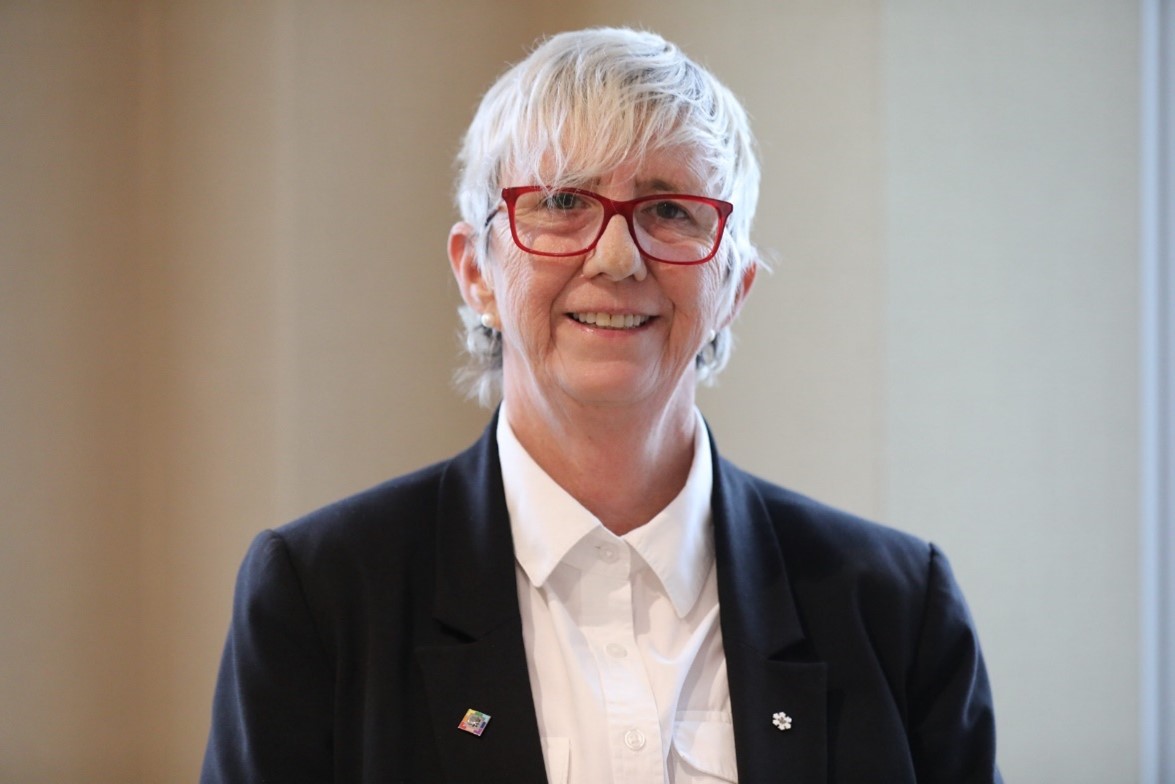
“I never thought that my sexual orientation was a crime. I was a very proud soldier,” Martine Roy said. Yet she was discharged from the Canadian Armed Forces for being homosexual. Her work after service included developing inclusivity policies in the private sector, and helping set up resources for 2SLGBTQI+ employees, as well as prominent advocacy work.
You can hear Martine’s full story on our website. You can also visit our Pride in service web page to learn more about the history of 2SLGBTQI+ Canadians in uniform, including the Purge.
National Indigenous History Month
New cenotaph, cemetery and healing garden fulfills long-time dream of Abegweit First Nation
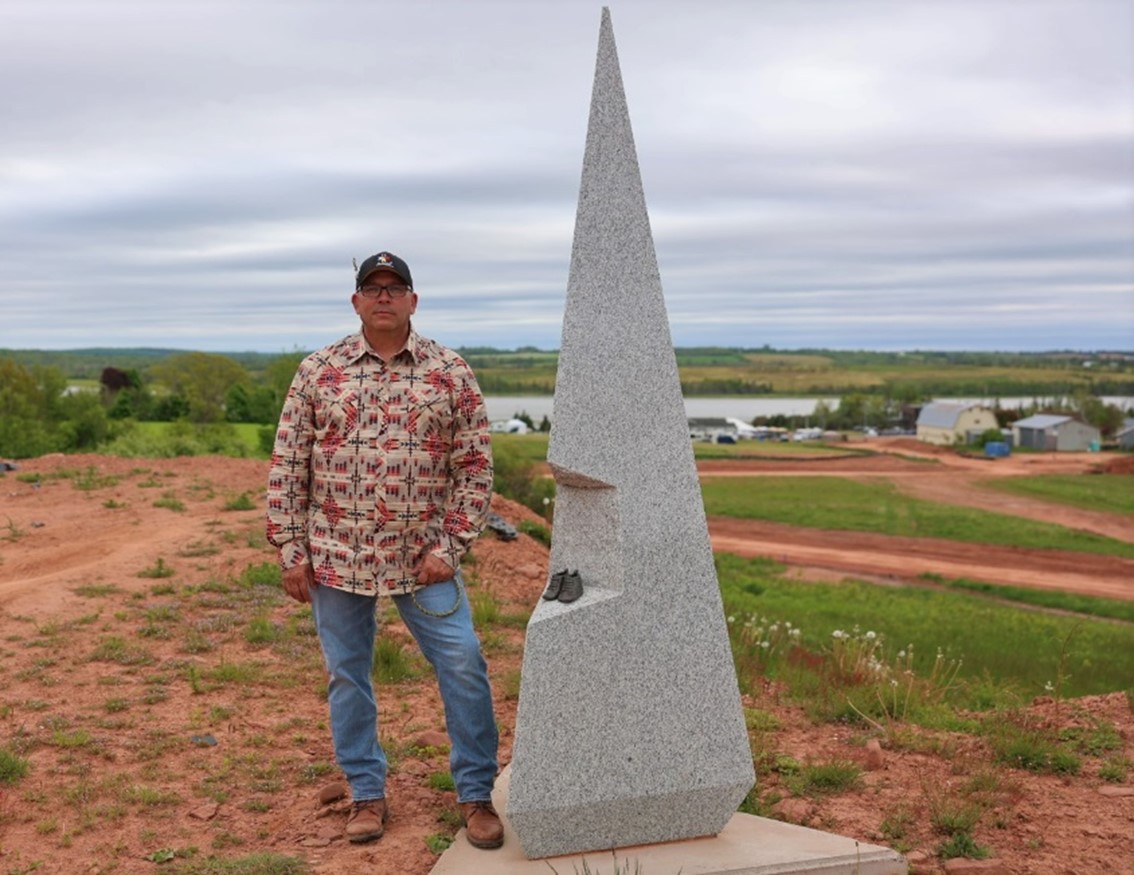
Chief Rod Gould stands proudly on his ancestral land where the dream of an Abegweit First Nations’ Cenotaph and cemetery has become a reality for him and his community, Abegweit First Nation in Scotchfort, Prince Edward Island.
On a warm spring day, trees burgeoning with green leaves line the Abegweit First Nations community’s new cemetery, cenotaph and healing garden. Below the slope, the sun glistens off the Hillsborough River.
“I can’t wait to be buried here,” Chief Rod Gould says.
In addition to being the resting place of all First Nations community members, the new Abegweit Memorial Cenotaph, partially funded by Veterans Affairs Canada through the Community War Memorial program, also recognizes those who served in Canada’s efforts during war, military conflict, and peace.
The bulk of the construction of the community’s new sacred spot was completed in the fall of 2023. Gould calls it a “happy hunting grounds”—a gathering place for the community and a beacon of remembrance for motorists passing on the TransCanada Highway below.
Voices echo off a natural perimeter of trees which will soon be outlined by a wrought-iron gate and arch inscribed with “Wutqutane’kait,” the Mi’kmaw word for cemetery. A healing garden with traditional plants is planned near the three-sided granite cenotaph, which was designed in consultation with the community, and has been permanently illuminated in the open field.
The names of Indigenous Veterans from Abegweit First Nation will soon be etched on the stone of the cenotaph.
The project has been a community priority for many years and a passion for Chief Gould. Many members of his family have served—a great-great uncle in the First World War, a great uncle in the Second World War, and a brother in the RCMP. Now, a fourth generation, a nephew, carries on that legacy of service in municipal policing.
Setting names in stone is particularly significant, as many Indigenous people who served in the Canadian Armed Forces were either unrecognized or had their given, ancestral names replaced by English ones, creating confusion and a lack of recognition of their rightful place in history.
“I think of the loss of identity and the displacement of our people,” Gould said.
“We have dead ancestors who fought for this country, gave their lives for it, gave up their name to fight for this country. Those stories remain untold. That is something that has been highlighted in this project.”
The site overlooks the river where their Mi’kmaq ancestors fished and camped year round for centuries. Its location is significant. Placing the burial ground and cenotaph in the heart of the community fits with the Mi’kmaw tradition of leaving an empty seat at the drum or feast table for the spirit world.
“Everything in our culture is about where we are buried, where we go in the afterlife and how we take care of our family when they are gone,” Gould says.
“We will gather here, not just one day of the year, on Remembrance Day, but it will be a place to continue to honour and include our ancestors in all of our celebrations.”
The cenotaph has three sides to represent Prince Edward Island’s three Indigenous communities.
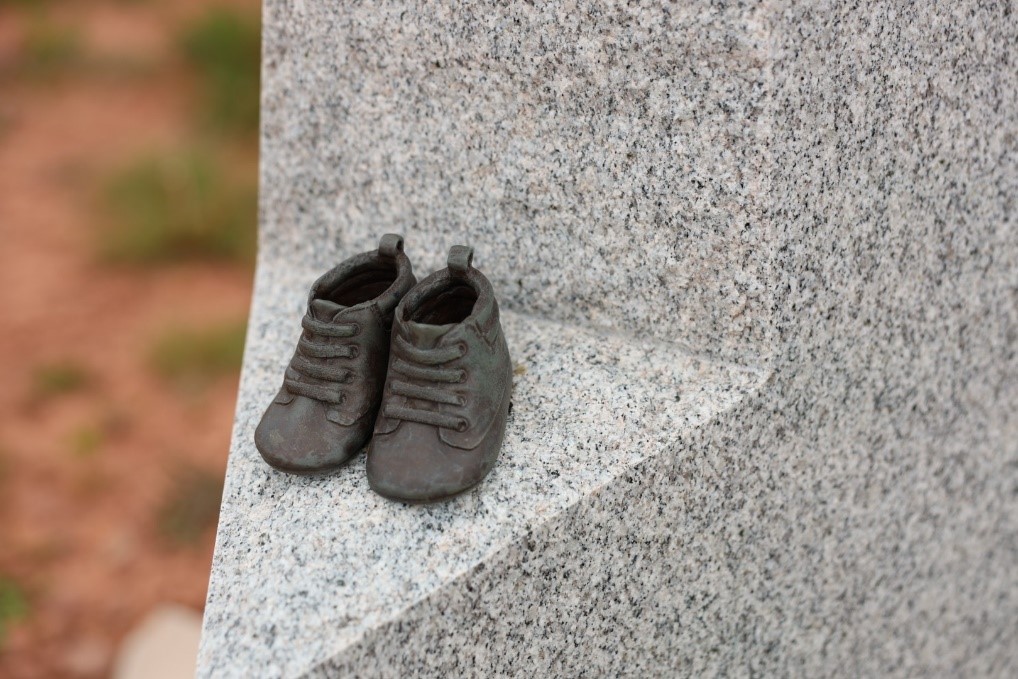
A tiny bronze pair of moccasins, representing the Indigenous children who died in Residential Schools are inlaid in the monument.
Many members of these communities, including Veterans and Elders, are buried at a nearby Catholic church. Gould explains that plans include exhuming and re-interring the remains in the new burial ground, which will also be a burial place for future generations.
“There are a lot of displaced Elders all across Atlantic Canada, the United States and even in Europe—our ancestors remains are scattered in unmarked graves,” Chief Gould says. “To us, it’s our closure, it’s bringing our ancestors home where they belong.”
The discovery in recent years of unmarked graves of Indigenous children at the former sites of residential schools has exacerbated the pain and the sense of displacement of his community, Gould said. He believes the new memorial will be an important symbol for everyone, regardless of their loss.
“This is about the truth.”
The new cenotaph will help educate and engage youth, Veterans, members of the Canadian Armed Forces, and the general public through individual and family commemoration, special events, funerals and ceremonies on Indigenous Veterans Day and Remembrance Day.
With courage, integrity and loyalty, the Abegweit First Nations community is leaving their mark. With this beautiful new cenotaph and cemetery they are demonstrating their gratitude and respect for First Nations Veterans and Canadian Armed Forces members. You can find more stories of Canadian Veterans at They proudly served.
Commemoration and recognition is one way Veterans Affairs Canada honours Veterans and the fallen. For services and benefits that support the well-being of Veterans and their families, go to Services and benefits to learn more.
Veterans' stories
At almost 100, Roly Armitage’s Second World War memories remained vivid
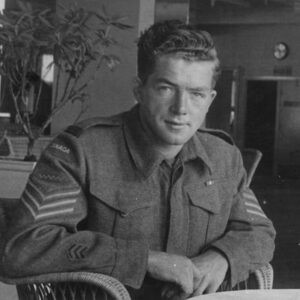
A glass jar of sand sits proudly displayed in the entrance of Roly Armitage’s room at Perley Health's Rideau Veterans Residence in Ottawa. “D-Day sand Juno Beach,” is written on a yellow sticky note.
The grains of sand are a souvenir from a recent trip back to that infamous beach that the 99-year-old Second World War Veteran vividly remembered 80 years later.
Armitage was 19 and fresh off his Ottawa family farm when he joined 14,000 Canadian soldiers who landed at Bernières-sur-Mer, France on D Day, 6 June 1944. He remembers his wet feet and a pounding heart that day.
Roly Armitage would have been 100 years old 8 February 2025.
Read his full story in People and stories.
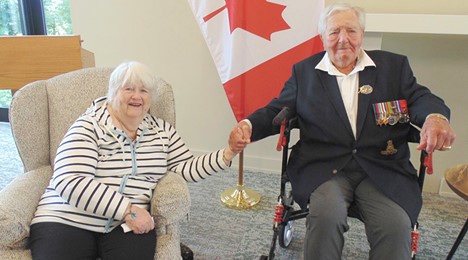
Roland Armitage and Sonja Jobes meet in Ottawa in 2023.
D-Day Veteran and former Mayor Roland Armitage passed away on 19 June 2024, after this profile was written and approved by him.
Lynette Peters: Shaping the future
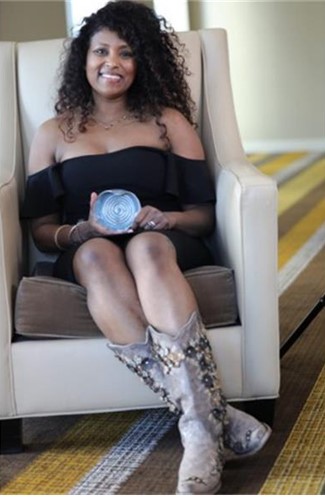
Art can be a way to express yourself and find meaningful purpose during the transition to life after military service. Lynette Peters helps Veterans navigate this transition through craft.
Lynette Peters, a ceramicist, military spouse and PhD health candidate at Halifax’s Dalhousie University, operates a ceramics studio near Lawrencetown Beach, Nova Scotia. This is where she gives Veterans free opportunities to express their creativity through clay arts.
Watch the Lynnette Peters video interview.
You can read Lynette’s full story on our website.
If you or someone you know is transitioning to life after service, check our website for services related to mental and physical health, finances, education and jobs and housing and home life. We also provide services to families and caregivers who support our Veterans.
Do you have a story to share about experience in the Canadian Armed Forces? Tell us about it by email.
Commemoration
Learn more about the unknown Newfoundland First World War soldier arriving home
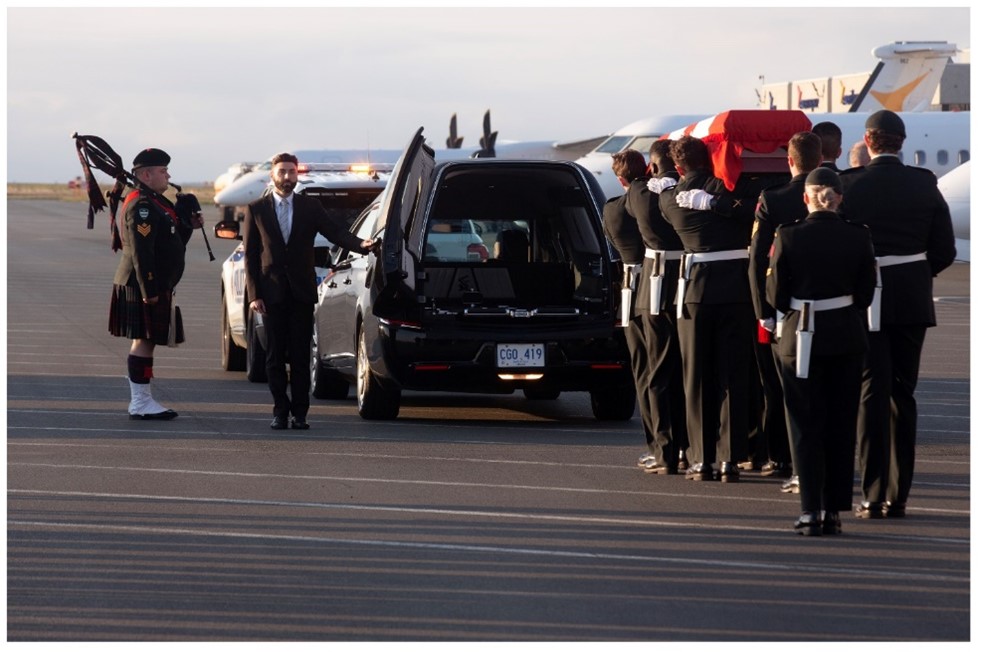
The remains of an unknown Newfoundland First World War soldier arrive home in St. John’s, Newfoundland and Labrador on 25 May 2024.
The French government transferred the remains of an unknown Newfoundland First World War soldier to the Government of Canada and the Government of Newfoundland and Labrador in a ceremony at the Beaumont-Hamel Newfoundland Memorial on 25 May 2024.
Then, the Canadian Armed Forces (CAF) transported the soldier with full honours back to St. John’s, Newfoundland and Labrador.
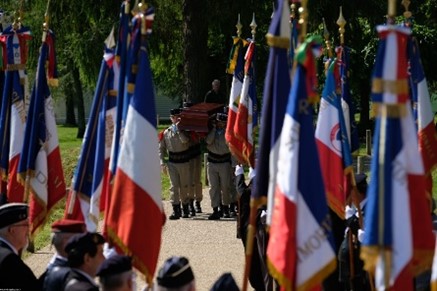
Members of the French military bring the casket of an unknown Newfoundland First World War soldier to foot of the caribou monument during the ceremony at the Beaumont-Hamel Newfoundland Memorial.
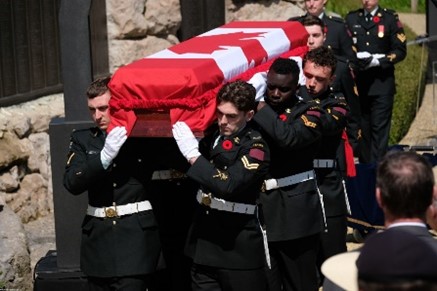
CAF members carry the unknown soldier’s casket draped in a Canadian flag.
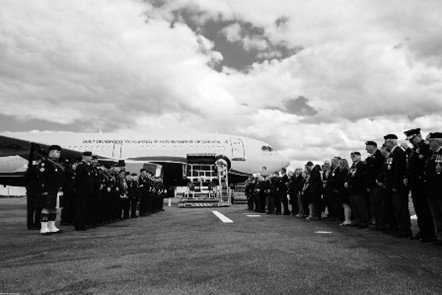
CAF members, delegates and invited guests pay their respects during the ramp ceremony in France on 25 May 2024.
Upcoming events
From 28 to 30 June, the public may pay their respects to the unknown soldier during a lying-in-state in St. John’s. Artwork created by students across Newfoundland and Labrador will be displayed as part of this historic event.
On 1 July 2024—the 100th anniversary of the unveiling of the Newfoundland National War memorial in St. John’s—a new tomb will be unveiled at the base of the memorial and the remains of an unknown soldier will be reinterred. The unknown soldier will represent Newfoundlanders and Labradorians in all branches of service who have no known grave.
This initiative to commemorate the service members who have no known final resting place is led by the Government of Newfoundland and Labrador and is proudly supported by Veterans Affairs Canada, the Royal Canadian Legion–Newfoundland and Labrador Command, Canadian Armed Forces and the Commonwealth War Graves Commission.
Education materials
Canadian students of all ages can learn about the unknown Newfoundland soldier with Veterans Affairs Canada’s featured learning activity, Did he have freckles? The activity is designed to help students make a personal connection with this powerful symbol of remembrance. Their mission? Use art to help us all imagine who the soldier buried in the tomb may have been.
For more information, visit the Repatriation of an unknown Newfoundland First World War soldier web page.
Young Newfoundland and Labradorian Reservist feels kinship with unknown soldier
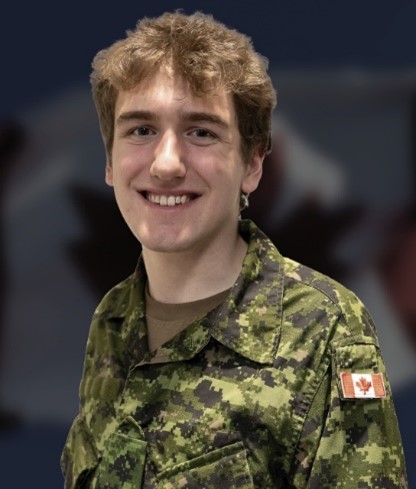
Honouring the past, preparing for the future
Private Benjamin Miller feels a deep connection to a fellow Newfoundlander his age who died 100 years ago, even though he doesn’t know the boy’s name.
The 16-year-old Newfoundland Reservist says the repatriation of the remains of an unknown Newfoundland First World War soldier killed in France carries great significance for all Newfoundlanders and Labradorians.
“He’s returning home in the same colours he left in,” said Miller, 16, who joined the 1st Royal Newfoundland Regiment in February 2024.
“Those boys were sent off to the front lines. They were teenagers, just like me.”
Miller, whose great-grandfather was in the Merchant Navy in the First World War, says he’s made his family proud by choosing military service. He is currently the youngest serving member of his regiment. “My Pop is pretty proud of me.”
The Grade 11 student at Holy Spirit High School in Conception Bay South likes math, working out and tinkering with cars. He says he grew up hearing stories of the devastating losses Newfoundlanders and Labradorians suffered during the Great War.
This unknown soldier represents all of those who didn’t get to come home.
“It took him 100 years to get this honour he so deserved.”
Newfoundland was a British dominion separate from Canada during the First and Second World Wars. About 12,000 Newfoundlanders served during the Great War, with more than 1,700 dying in the field. There are no known graves for about 800 of those killed.
That makes bringing this soldier’s remains home a very important event for Newfoundlanders and Labradorians, Miller said.
During a ceremony at the Beaumont-Hamel Newfoundland Memorial on 25 May 2024, the Government of France transferred the remains of an unknown First World War Newfoundland soldier to Canada. The Canadian Armed Forces then transported the remains to Newfoundland and Labrador later that day. The hearse travelled past key locations in St. John’s. These would have been local landmarks members of the Newfoundland Regiment passed as they left the city to go to war.
The public may pay respects to the soldier during a lying-in-state from 28 to 30 June 2024 at the Confederation Building, overlooking the city of St. John’s.
This Memorial Day is the 100th anniversary of the unveiling of the Newfoundland National War Memorial. As part of this ceremony, a new tomb will be unveiled at the base of the memorial and the remains of an unknown soldier will be reinterred. The memorial is located on the harbour, where his regiment sailed from a century ago.
The tomb of an unknown Newfoundland First World War soldier will represent all Newfoundlanders and Labradorians from all branches of service who have no known grave.
As Miller looks forward with anticipation and excitement to his own military future, he reflects on his home province’s rich military history.
“That is something I hold close to my heart. They made such a great sacrifice, the ultimate sacrifice. We can’t forget that,” he says. “Now he can finally be at rest.”
With courage, integrity and loyalty, Private Benjamin Miller is leaving his own mark on history. He is one of our Canadian Armed Forces members you can read about in our People and stories section.
The well-being of Canadian Veterans is at the heart of everything we do. As part of this, we recognize, honour and commemorate the service of all Canadian Veterans. Our Programs and services page has more information about what is available.
Major-General ends military career by honouring an unknown Newfoundland soldier
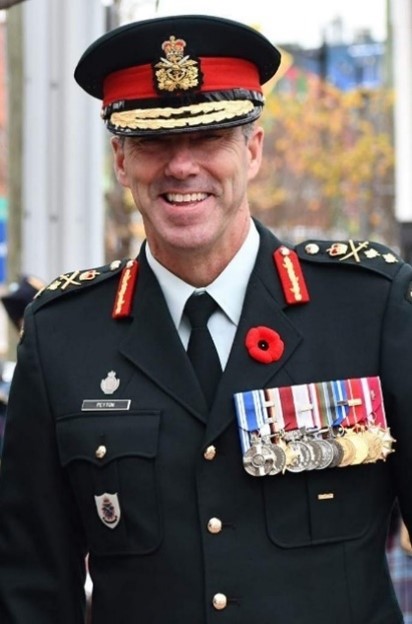
At the end of his 35-year military career, Major-General Paul Peyton is honoured to help shepherd the remains of an unknown Newfoundland First World War soldier home from Northern France.
“The people of Newfoundland and Labrador have a strong sense of community and a culture of contributing to the greater good. Bringing this soldier home honours all of the soldiers who never made it home. I am so happy to be given this opportunity.”
Newfoundland was a British dominion separate from Canada during the First and Second World Wars. About 12,000 Newfoundlanders served during the First World War, with more than 1,700 killed in action. There are no known graves for about 800 of those killed.
On 1 July 2024, the Government of Newfoundland and Labrador will unveil a tomb at the base of the Newfoundland National War Memorial. There, the remains of an unknown soldier from the First World War will be reinterred.
As the most senior serving member present at the event, Peyton will lay a wreath on behalf of the Canadian Armed Forces as the unknown soldier is laid to rest in the granite and labradorite tomb overlooking St. Johns Harbour.
It will be a full circle moment for Peyton, who spent five years as an army Cadet in his hometown of Goose Bay, Labrador before enrolling in the Canadian Armed Forces as an Armour Officer in 1989.
Read his full story in People and stories.
Canada’s military athletes: champions of resilience
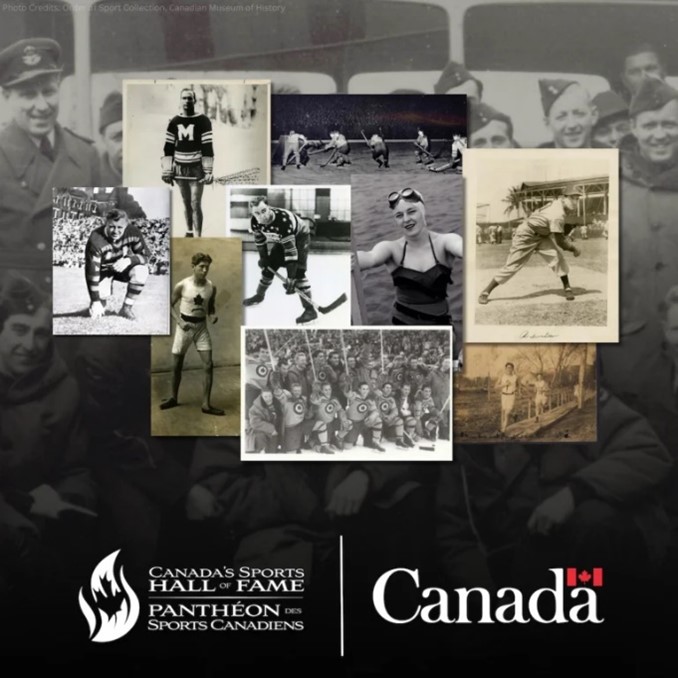
Photo: Canada Sports Hall of Fame
This summer, visitors to Canada’s two national historic sites in France can learn stories about Canadian athletes who served in the military.
Beginning in June, visitors can explore the Play Hard, Fight Hard: Sport And The Canadian Military display at the Vimy Visitor Education Centre in France. The pop-up exhibit focuses on the role of sports in Canada’s armed forces through the years.
Also, visitors to the Canadian National Vimy Memorial and Beaumont-Hamel Newfoundland Memorial will be able to learn more about the efforts and accomplishments of Canadian Invictus competitors. The Invictus Games are an international sporting event for wounded, injured and ill Veterans and serving members. The Games use the power of sport to inspire recovery and support rehabilitation. The Invictus movement also generates a wider understanding and respect of service, and the important role friends and family play in the military community.
During the First and Second World Wars and the Korean War, Canadian military members took part in sports to boost morale, relieve stress and stay in shape. The connection between sport and the Canadian military continues today. Veterans and Canadian Armed Forces members represent our country in the Olympics, Paralympics and the Invictus Games.
The 2025 Games will be held on the traditional territories of the Lil̓wat7úl (Líl̓wat), xʷməθkʷəy̓əm (Musqueam), Sḵwx̱wú7mesh (Squamish) and səlilwətaɬ (Tsleil-Waututh) Nations in Whistler British Columbia. The 2025 Games will also include adaptive winter sports for the first time.
Visit the 2025 Invictus Games website to learn more.
Veterans Affairs Canada are partnering with Canada’s Sports Hall of Fame to host its pop-up exhibit.
To read more remarkable stories of Veteran athletes and follow the Canada’s Sports Hall of Fame social media channels, visit the bilingual Play Hard, Fight Hard web page.
Join us to celebrate the Olympics and Paralympics this summer, and the Invictus Games in 2025.
Commemoration calendar
July
- 1 July:
- Newfoundland Regiment suffered heavy losses at Beaumont-Hamel, 1916
- 2 July:
- Royal Canadian Air Force (Women’s Division) authorized during Second World War, 1941
- 5 July:
- No. 2 Construction Battalion authorized during First World War, 1916
- 7 July:
- Canada’s combat mission in Kandahar ended in Afghanistan, 2011
- 9-10 July:
- 80th anniversary of Canadians helping liberate Caen during Battle of Normandy, 1944
- 26 July:
- Dedication of Canadian National Vimy Memorial in France, 1936
- 27 July:
- Korean War Veterans Day—active fighting in Korean War ended with signing of armistice, 1953
- 31 July:
- The Women’s Royal Canadian Naval Service established during Second World War (1942)
Engagement
Learn to meditate as part of a new study for Canadian Veterans with PTSD
Are you a Veteran living with PTSD? As part of a new study, you can learn a form of breathing-based meditation that may help with your symptoms of PTSD.
Researchers from the Atlas Institute for Veterans and Families and Sinai Health are looking for former CAF and RCMP members living with PTSD to participate in an online research study. The research will examine the effectiveness of a form of breathing-based meditation that may improve symptoms of PTSD.
Please consider participating if you are:
- a Veteran of the CAF and/or RCMP
- 18 years of age or older
- impacted by a past trauma
- able to participate in a six-week meditation program and attend follow-up sessions
The research study is operating on a rolling admission basis. The meditation program is delivered virtually through videos calls. It is available in French and English and is free to attend.
Results of the study will be used to further research and support future programming and treatment for Veterans across the country.
For more information, visit the study website, call 647-804-6121, or email SKY.PTSD@sinaihealth.ca
Can Praxis and the healing power of equine therapy for Veterans and their families
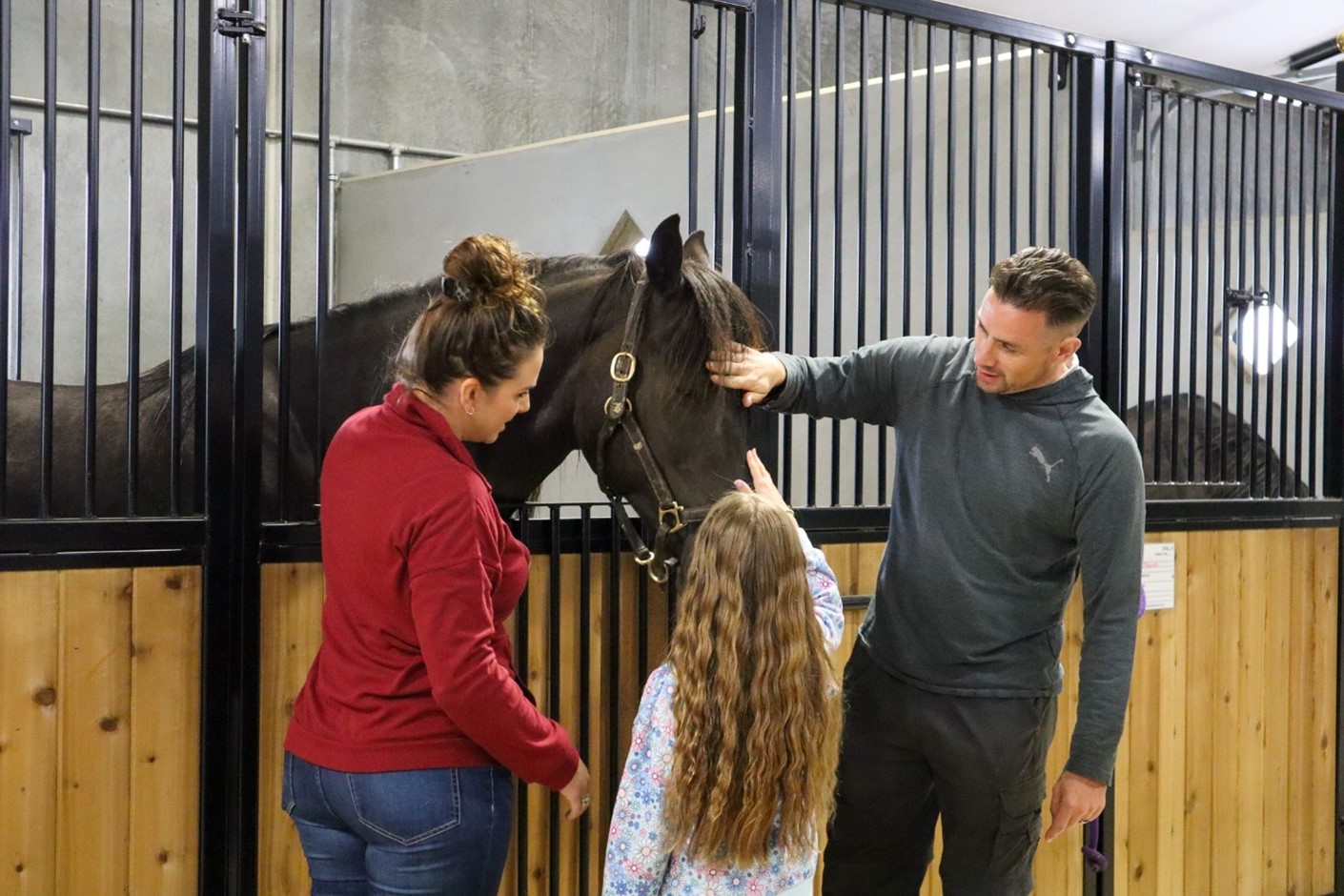
With support from the Veteran and Family Well-being Fund, Can Praxis offers equine therapy in a family program for Veterans and their family members, including children between the ages of 8 and 24.
The idea for Can Praxis came to Steve Critchley while he was on a horseback ride. It’s a registered charity that offers equine therapy in a mental health recovery program for Veterans and first responders.
Critchley, a fourth-generation Veteran who had served for 28 years, noticed how responsive his horse was to his mood and mental health. He realized that interacting with horses could help someone identify and address their own emotions. In 2013, this inspired him to found Can Praxis, the name of which combines references to a “can-do” attitude and the Latin word for putting theory into practice. Its goal is to help Veterans and their families recover from operational stress injuries like post-traumatic stress disorder.
The main objectives for Can Praxis are to break down multi-generational mental health injuries, and help family members to understand emotions and have safe conversations about them. With support from the Veteran and Family Well-Being Fund, Can Praxis offers programs at their base in rural Alberta, and it is open to Veterans and their families (whether traditional or chosen) from all over Canada. The charity is run by a number of dedicated volunteers, registered psychologists and Ph.D researchers who take a neuroscience-based approach to equine therapy and its impacts on mental health. With research and help from experts, Can Praxis has been able to improve lives of participating families, inspiring hope after the program has been completed.
“This is so much more than just hanging out with horses,” Critchley explains, noting the careful consideration facilitators take when welcoming these families to the program. While engaging with a horse can serve as a barometer for how someone is managing their emotions, it can also increase dopamine levels in participants, help interrupt trigger responses and improve mental well-being. Along with equine therapy, there are debriefing sessions and a classroom component where families learn to break down barriers to communication within their family unit.
In addition to adult participants, children between the ages of 8 and 24 are welcome to join with their families and learn to initiative conversations about their emotions.
A large number of participants report that the program have had significant and positive impacts on their lives following the program. Critchley and his team hope to continue helping Veterans and first responders for many years to come and show them that there is a light at the end of the tunnel.
Those interested in learning more about the organization can visit their website and Facebook page.
Call for applications: Veteran and Family Well-being Fund
Does your organization help Veterans? Good news! The Veteran and Family Well-being Fund (VFWF) is accepting new applications until July 12.
The VFWF provides grants and contributions to private, public, academic or Indigenous organizations to conduct research and implement initiatives and projects that support the well-being of Veterans and their families. The fund has supported 123 initiatives since it was created in 2018.
The fund can support a wide range of projects, such as suicide prevention research, helping homeless Veterans find housing, or any innovative projects that contribute to the well-being of Veterans and their families. Whatever it may be, we encourage you to share your idea and submit an online application.
In addition to support projects that address Veteran health, research, and employment, a portion of this year’s funding will also be allocated to organizations and initiatives that support women, Indigenous, and 2SLGBTQI+ Veterans.
For more information and to apply online, visit the Veteran and Family Well-being Fund web page.
Apply for Community Engagement funding today
If your organization is planning an initiative to honour Canada’s Veterans, it could be eligible for Commemorative Partnership Program (CPP) funding.
Commemoration can take many forms. Your group could be eligible if you’re planning a ceremony, a learning activity or an innovative project. Participants could receive up to $25,000 for projects that focus on at least one of the following groups:
- modern Veterans
- women Veterans
- Indigenous Veterans
- racialized Veterans
- 2SLGBTQI+ Veterans
- Canadian Armed Forces Veterans who have served our country in domestic operations such as wildfires, ice storms and floods.
Applications are accepted on a first-come, first-served basis, until 30 June 2024. Projects must be completed this fiscal year (before 31 March 2025). It may take up to three months to process your application and for a final decision to be made. All applicants will be notified when a decision is made.
Visit the Commemorative Partnership Program page for more information and read our guidelines to find out if you are eligible.
Apply now
Organizations planning a commemorative event or project in their communities are encouraged to apply for funding available through the online portal. The deadline to submit an application is 30 June 2024.
Veterans Affairs Canada honours those who served in Canada in times of war, military conflict and peace, and keeps the memory of their achievements and sacrifices alive for all Canadians. Join us in commemorating our country’s Veterans and apply today.
Do you know other Veterans, family members or others who would benefit from the information in this newsletter? Feel free to share it with them.
